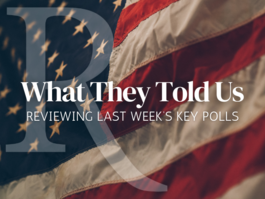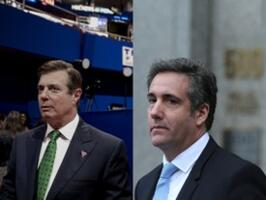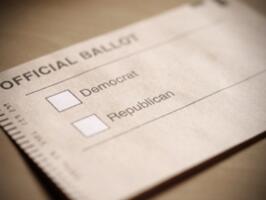What They Told Us: Reviewing Last Week’s Key Polls - Week Ending August 25, 2018
Democrats are hoping they don’t have to wait until 2020 to erase Hillary Clinton’s 2016 debacle, but voters in general aren’t that impatient.

Democrats are hoping they don’t have to wait until 2020 to erase Hillary Clinton’s 2016 debacle, but voters in general aren’t that impatient.

Voters still tend to think the highly publicized cases of Trump associates Paul Manafort and Michael Cohen will not cause criminal problems for the president, but it’s a party line vote.

"If anyone is looking for a good lawyer," said President Donald Trump ruefully, "I would strongly suggest that you don't retain the services of Michael Cohen." Michael Cohen is no Roy Cohn.

Voters agree with President Trump that America should come first on the world stage but don't think the Democratic party's next presidential nominee is likely to agree.

When you lose a game, particularly a game you had good reason to expect you'd win, do you try to figure out how to play better? Or is your first reaction to demand changes in the rules?

Voters are continuing to grow more confident that the United States will remain the world’s top superpower for the foreseeable future.

Earlier this week, North Carolina became one of at least four states to raise the hourly minimum wage of state workers to $15.

Fewer voters now say they’re following the news more closely than they were a year ago, but they still overwhelmingly consider the news they are getting reliable.

Tuesday’s bombshell developments — the conviction of President Trump’s former campaign chairman, Paul Manafort, followed in swift succession by a guilty plea from the president’s former lawyer, Michael Cohen, that seemed to implicate the president in a scheme to skirt campaign finance laws — may very well not move the president’s approval rating. Previous developments related to Robert Mueller’s investigation of the 2016 campaign and Russian involvement really haven’t. But it would be wrong to look at what happened earlier this week and argue that the Cohen/Manafort news doesn’t mean anything to the battle for the House.

Americans are feeling great about life these days, though most say the best years happen before 40.

Former Vice President Joe Biden remains the clear favorite among Democrats to be their presidential nominee in 2020. Bernie Sanders, the Vermont senator who challenged Hillary Clinton for the party’s nomination in 2016, is a fading second.

YouTube just added an "information panel" to all my videos about climate change.

At this unique moment in American history, liberals and conservatives have something in common: an abhorrence of government prosecutors run amok.

For the first time in months, Democrats and Republicans are tied on the Rasmussen Reports Generic Congressional Ballot.

Following the “Unite the Right’s” first anniversary white supremacy rally earlier this month that was counter-protested by groups like so-called “antifa”, voters think police do a good job dealing with violent protesters but don’t think the media sides with them.

President Trump last week urged Attorney General Jeff Sessions to bring a lawsuit against drug companies that produce opioids and therefore contribute to the growing epidemic.

Aretha Franklin died last week at the age of 76. She was known as the Queen of Soul, and most Americans have R.E.S.P.E.C.T. for her work.

Take a wild guess what country is reducing its greenhouse gas emissions the most? Canada? Britain? France? India? Germany? Japan? No, no, no, no, no and no.

In backing John Brennan's right to keep his top-secret security clearance, despite his having charged the president with treason, the U.S. intel community has chosen to fight on indefensible terrain.

For the second week in a row, 43% of Likely U.S. Voters think the country is heading in the right direction, this time according to a new Rasmussen Reports national telephone and online survey for the week ending August 16.